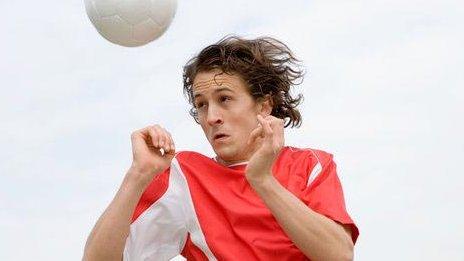Jeff Astle: Head injury footballer's case tip of the iceberg?
- Published
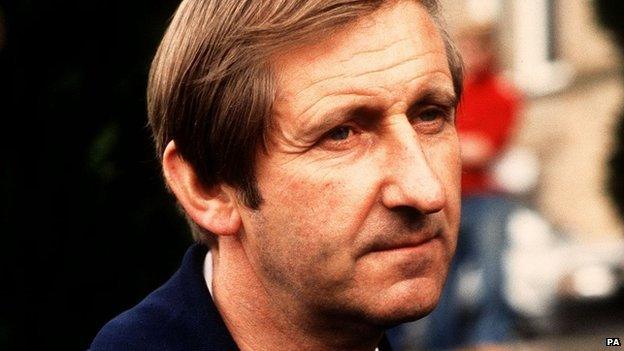
Ally MacLeod died, aged 72, in 2004 after suffering with Alzheimer's disease for 10 years
It is 12 years since an inquest into the death of England and West Bromwich Albion footballer Jeff Astle ruled he died from brain trauma caused by heading heavy leather footballs.
After the FA failed to publish promised research into the condition, the Astle family renewed calls for a study to be done via its Justice for Jeff campaign.
The campaign has prompted other families of ex-players to come forward, claiming Astle's case could be the "tip of the iceberg".
Among them is physiotherapist, Andrew MacLeod, whose father Ally managed Scotland at the 1978 World Cup in Argentina.
He believes his dad developed Alzheimer's after repeatedly heading a ball during a 16-year playing career with teams including Hibernian and Blackburn Rovers.
He died in 2002, aged 59, after suffering with the disease for almost 10 years.
"It started as memory loss and forgetfulness," Mr Macleod said. "He would forget where my house was or he would ask to go and visit his mother in Glasgow who had died 23 years before.
"I was keen to see the research by the FA published because if there is evidence that repetitive heading causes brain injuries then it does have consequences even for the modern day player."

West Bromwich Albion fans held protests at the teams games against Cardiff City and Hull City
Richard Wickson, the chairman of Reading Football Club's former players' association, believes the Astle case is "the tip of the iceberg".
"We're hearing a lot of disturbing stories from organisations like ours around the country and it seems that these illnesses are affecting players from a certain era, the 50s and 60s," he said.
"I think the fear of having to pay out compensation is the only thing holding back the authorities from fully researching it.
"But the families I have spoken to are not interested in money they just want to make sure young players don't suffer."
In a letter to Astle's widow, Laraine, the chairman of the FA, Greg Dyke, said a commission had been set up to investigate head injuries, which includes representatives from the FA, the Professional Footballers' Association (PFA) and the Premier League.
A spokesman for the FA said "The football commission on head injury... are working towards increasing awareness at all levels of the game of football."
Dr Michael Lipton is currently carrying out a study with adult amateur footballers in the US investigating how heading impacts on the brain.
His initial findings suggested heading a ball more than a 1,000 times a year could cause traumatic brain injury.
"Those people were also more likely to perform worse in cognitive tests especially memory and, less so, processing speed and attention," he said.
"There is clear data that traumatic brain injury increases the risk of Alzheimer's and dementia maybe as much as three fold."
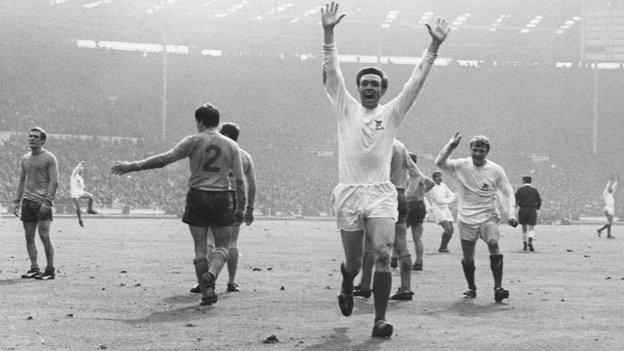
Jeff Astle scored the winning goal in West Brom's 1-0 victory over Everton in the 1968 FA Cup final
However, scientific opinion on the issue is divided.
Dr Andrew Rutherford, of Keele University, has been researching possible brain damage caused by heading for more than 10 years. He said there was no definite evidence to link it to dementia.
"There is a danger that when somebody who happens to have been a footballer suffers from dementia, it becomes highlighted as a problem with football when it could be any number of causes just as it is in a person who never played the game," he said.
"With these individual cases it can appear that a large number of ex-players are suffering from dementia.
"That may be the case, but it could also just be five or six footballers in the whole of the country that suffer from that particular problem."
- Published2 April 2014
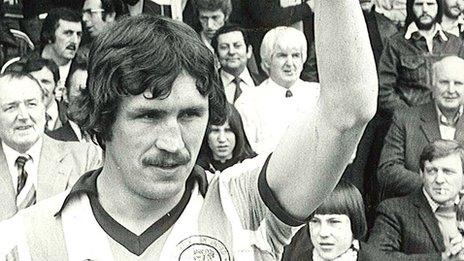
- Published25 March 2014
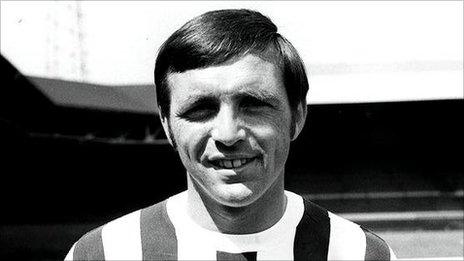
- Published18 March 2014

- Published18 January 2012

- Published29 November 2011
